Holden Barina maintenance and workshop manual
The Holden Barina is a subcompact vehicle available because 1985 by Holden, the Australian arm of General Motors.The initially generation MB Barina was introduced inside 1985 because a badge-engineered Suzuki Cultus because a five-door hatchback.In the Used Car Safety Ratings
Suzuki Swift Holden Barina 1989 1993 Autofix Service Manual
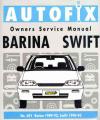
Suzuki Swift Holden Barina 1989 - 1993 Autofix Owners Service Manual covers: Barina MF MH 1989 - 1993 3 Door Hatchback and GS 5 door Hatchback Swift SF November 1990 - 1993 4 Door Sedan GL 1.3 Litre Carburettor models.Contents: General Information Technical Data Routine Maintenance Engine Emission Control Engine Electrical Cooling System Fuel and Engine Management Clutch Manual Transmission Automatic Transmission Front Axle and Suspension Rear Axle and Suspension Steering Brakes Body Electrical Body
Holden Barina (Vauxhall Opel Corsa) 1997-2000 Haynes Service Repair Manual
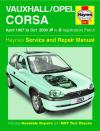
Holden Barina (Vauxhall / Opel Corsa) 1997 - 2000 Haynes Service and Repair Manual Get Other Holden Barina Repair Manuals click here NEW hardcover UK manual covering the Vauxhall/Opel Corsa Combo sold in Australia as the Holden Barina. covers models: Hatchback Corsavan and Combo Van Including Special/Limited Editions 1997 - 2000Petrol Engines covered: #9679; 1.0 litre (973 cc) DOHC X 10 XE 3-cylinder #9679; 1.2 litre (1196cc) SOHC X 12 SZ 4-cylinder #9679; 1.2 litre (1199cc) DOHC X 12 XE 4-cylinder #9679; 1.4 litre (1389cc) SOHC X 14 SZ 4-cylinder #9679; 1.4 litre (1389cc) SOHC C 14 SE 4-cylinder (multi-point fuel injection) #9679; 1.4 litre (1389cc) DOHC X 14 XE 4-cylinder #9679; 1.6 litre (1598cc) DOHC X 16 XE 4-cylinderDoes NOT cover Diesel models.Does NOT cover new Corsa range introduced October 2000.Inside this manual you will find: Routine Maintenance tune-up procedures engine repair cooling and heating air-conditioning fuel and exhaust emissions control ignition brakes suspension and steering electrical systems and wiring diagrams
Holden Barina 1985 1993 Suzuki Swift 1990 1993
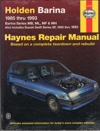
Holden Barina 1985 - 1993 and Suzuki Swift 1990 - 1993 Haynes Owners Service Repair ManualNEW Paperback Other Holden Barina Repair Manuals click here Other Holden Car Repair Manuals click here Holden Barina 1985 - 1993 / Suzuki Swift 1990 - 1993Haynes Owners Service Repair ManualHolden Barina 1985 - 1993 / Suzuki Swift 1990 - 1993 Haynes Owners Service Repair Manual Covers models: Holden Barina Series MB ML MF and MH with 1.3-litre engine 1985 - 1993 Suzuki Swift Series SF with 1.3-litre engine 1990 - 1993.Does not include three-cylinder or EFI engineContents: Introductory PagesAbout this Manual; Introduction to the Holden Barina Suzuki Swift ; Vehicle Identification Numbers; Buying Parts; Maintenance Techniques Tools and Working Facilities; Jacking and Towing; Booster Battery (jump) starting; Automotive Chemicals and Lubricants; Conversion Factors; Safety First!; Troubleshooting Tune-Up and Routine Maintenance Engine General Engine Overhaul Procedures Cooling Heating and Air Conditioning Systems Fuel and Exhaust Systems Engine Electrical Systems Emissions and Engine Control Systems Manual Transaxle Automatic Transaxle Clutch and Driveaxles Brakes Suspension and Steering
Holden Barina (Vauxhall Opel Corsa) Petrol Diesel 2003 2006
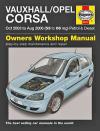
Holden Barina (Vauxhall / Opel Corsa) Petrol and Diesel 2003 - 2006 Haynes Owners Service and Repair ManualNEW Get other Barina service and repair manuals hereUk Manual Holden Barina (known in the UK as Vauxhall/Opel Corsa) petrol and diesel 2003 to 2006 Haynes Owners Service Repair Manual covers: Hatchback Corsavan including Special / Limited Editions. DOES NOT cover Combo van dual fuel models or new Corsa range introduced September 2006. This model was introduced to Australia in January 2004 as the MY04 version of the XC series Barina before being replaced by a Daewoo-sourced model TK Barina in December 2005. This manual does not cover rear disc brakes. Petrol Engines Covered: #9679; 1.0 litre (998cc) Z10XEP DOHC 3-cylinder #9679; 1.2 litre (1199c
Holden Barina MB ML 1985 1988 Gregorys Service Repair Manual
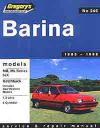
Get other Holden repair manuals hereHolden Barina MB-ML 1985 - 1988 Owners Service Repair Manual covers the Holden Barina MB and ML models built from 1985 to 1988 and fitted with the 1.3-litre engine with either manual or automatic transmission. It includes New Zealand models.Gregorys workshop manuals are produced for the Australian market. These vehicle specifications may vary from those sold in other countries. Please be aware of these possible differences prior to using the data contained within.Published by Gregorys (Gregorys)Information on Repair and Service ManualsNote that repair manuals are normally produced for models sold in a particular country.Differences in specification can exist between models sold in different countries and items such as installed engines can differ.Please check that the manual will cover your model before purchase and if you need more detail please contact us here..
Holden Barina Combo Petrol Diesel 2001 2010
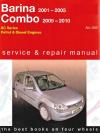
NEW Other Holden Barina Repair Manuals click here Other Holden Car Repair Manuals click here Holden Barina Combo (Petrol Diesel) 2001 - 2010 Gregorys Owners Service Repair Manual covers models: XC Series Barina 2001 - 2005 Combo 2005 - 2010.Petrol Engines Covered: 1.0 Litre 3 Cylinder (Z10XE) 1.2 Litre 4 Cylinder (Z12XE) 1.4 Litre (Z14XE)Diesel Engine Covered: 1.7 Litre Turbo (Y17DT Y17DTL)Contents: 1.0 1.2 litre Petrol Engine In-Car Repair Procedures 1.4 litre Petrol Engine In-Car Repair Procedures Diesel Engine In-Car Repair Procedures Engine Removal and Overhaul Procedures Cooling Heating Ventilation Systems Fuel Exhaust Systems - 1.0 1.2 litre Petrol Engines Fuel Exhaust Systems - 1.4 litre Petrol Engine Fuel Exhaust Systems - Diesel Engine Emissi
Vauxhall Opal Corsa Holden Barina 2000 2003 Haynes Service and Repair Manual UK
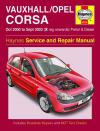
Holden Barina (Vauxhall / Opel Corsa) Petrol and Diesel 2000 - 2003 Haynes Owners Service and Repair ManualUSED in good condition Get other Barina service and repair manuals hereUK manual Holden Barina XC (known in the UK as Vauxhall / Opal Corsa) 2000 - 2003 Haynes Service and Repair Manual covers models: Hatchback Corsavan Combo Van inc. special/limited editions (NOT facelifted range from Oct 03)Engines covered: Z10XE 1.0 L (973cc) DOHC 3-cylinder petrol Z10XE-ECO 1.0 L (973cc) DOHC 3-cylinder petrol Z12XE 1.2 L (1199cc) DOHC 4-cylinder petrol Z14XE 1.4 L (1389cc) 4-cylinder petro l Y17DT 1.7 L (1686cc) non-intercooler DOHC 4-cylinder turbo-diesel Y17DTL 1.7 L (1686 cc) intercooled DOHC 4-cylinder turbo-diesel Transmissions covered: F 13/5 CR 5-speed manual (petrol engines) F 13/5 WR
Holden Barina SB Series 1994-1997 Haynes Service Repair Manual
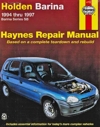
Holden Barina SB Series Haynes Service and Repair Manual 1994-1997NEW Other Holden Barina Repair Manuals click here Other Holden Car Repair Manuals click here Holden Barina SB Series 1994 - 1997 Haynes Owners Service Repair Manual covers the Holden Barina series SB 3 Door and 5 Door hatchbackPetrol Engines covered: #9679; 1.2 (1196cc) litre 12NZ C12NZ SOHC 4 cylinder #9679; 1.4 (1389cc) litre C14NZ C14SE SOHC 4 cylinder #9679; 1.6 (1598cc) litre C16XE DOHC 4 cylinderTransmissions described: #9679; F 10/4 WR F13/4 WR 4-speed manual #9679; F 10/5 WR F 13/5 WR 5-speed manual #9679; F 13/5 CR F 15/5 CR clode-ratio 5-speed manual #9679; AF 13 4-speed automaticNOTE: Only maintenance adjustment mino
The initially generation MB Barina was introduced inside 1985 because a badge-engineered Suzuki Cultus because a five-door hatchback. In the initially year of manufacturing a Road Runner unique model was available complete with decals showing the Warner Bros. cartoon character. A high-profile advertising campaign showcased the slogan Beep beep Barina, a catchphrase which remains inside the awareness of various Australians inside the present. The facelifted ML Barina was introduced inside September 1986, this included a coil sprung back end changing the leaf springs of the MB, a revised dashboard, headlights, tailgate plus lights, plus front grille.
In the Used Car Safety Ratings performed by the Monash University Accident Research Centre, published inside 2008, found which the initially generation Barina delivers a "greatly worse than average" amount of resident protection security inside the event of a accident. Achieving as much as 19 km/l found on the 1.0 3-cyl models, the gas expenditure about this model is great.
In New Zealand, the Barina was assembled by GMNZ from 1985 till 1989. From 1986 with 1989, a Holden Barina GTi model was moreover available, being a rebadged Suzuki Swift GTi. This car utilized the G13B engine.
The Suzuki Cultus is a supermini initially presented at the 25th Tokyo Motor Show, formally introduced with the Japanese domestic marketplace inside 1983 plus eventually produced inside 7 nations over 3 decades plus advertised internationally below over a dozen nameplates prominently because the Suzuki Swift, Geo Metro, plus Holden Barina.
Offered over its lifespan inside 4 body-style variations with motors within the Suzuki G engine family, the next generation Cultus nonetheless remains inside creation inside Pakistan. The Cultus family of cars has been advertised inside Asia, North America, South America, Australia, plus Europe. While not formally advertised inside New Zealand they were imported plus available found on the secondary marketplace.
The name Cultus derives within the Latin cultus, meaning "care" or "adoration."
In 1993 the Corsa B was unveiled, plus inside the UK, Vauxhall dropped the Nova name, with all the vehicle today being recognised as the Corsa. The following year, it was introduced by Holden inside Australia, because the Barina, substituting a variation of the Suzuki Swift available beneath which name. This proven a achievement, plus was the initial Spanish-built automobile with be available inside substantial volumes inside the Australian marketplace.
interior
Four-cylinder force came from 1.2, 1.4, plus 1.6 litre Family 1 petrol machines, and an affordable 1.5 L turbodiesel engine. Many vehicles received a five-speed guide transmission, though a four-speed automatic was furthermore accessible with certain machines. In the initial several years, a four-speed guide was moreover accessible combined with the smallest 1.2 litre engine. Unlike the past model, there was clearly no saloon adaptation, yet 1 was crafted inside Brazil for the Latin American marketplace, because saloons were much preferred with hatchbacks. This was furthermore introduced inside South Africa plus India. A station wagon, panel van plus pick-up truck were equally introduced. The wagon adaptation was available inside certain European markets, badged because an Opel. The Corsa furthermore spawned a tiny coupé called Opel Tigra. 1.0 L 3-cylinder plus 1.2 L 4-cylinder Family 0 economy variation was introduced inside 1997, along with a Lotus-tuned suspension was added in addition to an outdoor refresh.
The sedan model remains built plus available inside Latin America because Chevrolet Corsa Classic. A budget adaptation introduced for the Brazilian marketplace, the Chevrolet Celta, has bodywork resembling the late 1990s Vectra plus Astra. The Celta was available inside Argentina because the Suzuki Fun for a certain period. In 2011, GM stopped representing Suzuki inside Argentina, thus the Celta reverted with its authentic name beneath the Chevrolet brand. Argentinian creation started inside September 1997, where it was the initial nearby built Chevrolet passenger auto because 1978. The Latin American Corsa received a light facelift inside 1999, with easier bumpers, plus from April 2002 the Corsa B started being advertised because the "Corsa Classic".
The saloon plus wagon versions were yielded inside China by Shanghai GM because Buick Sail plus Buick Sail S-RV, respectively, till 2005. That year they became recognised as the Chevrolet Sail plus SRV. In September 2006, Chile became the initially nation outside China with obtain the Chinese-assembled Sail; it really is called the Chevrolet Corsa Plus, accessible because a four-door sedan with a 1.6 L 92 PS engine. The Corsa Plus involves double front airbags, anti-lock brakes, air conditioner, electrical windows plus central locking because standard equipment.
In India, the hatchback, saloon plus wagon versions were available because the Corsa Sail, Corsa plus Corsa Swing respectively till the finish of 2005. The hatchback model was nevertheless being yielded, plus thoroughly advertised inside South Africa because the Corsa Lite beneath the Opel branding till 2009 where point it was discontinued.
In Thailand, Corsa accessible because Opel plus gas injected 8V 1.4-liter engine plus "Joy" plus "Swing" variants, both accessible with 3 or 5-door plus guide or automatic.
In contemporary use, a torque converter is usually a kind of fluid coupling which is chosen with transfer rotating energy from a prime mover, like an internal combustion engine or electrical engine, with a rotating driven weight. The torque converter usually takes the area of the mechanical clutch inside a car with an automatic transmission, permitting the weight with be split within the force source. It is normally positioned amongst the engine's flexplate as well as the transmission.
The key characteristic of the torque converter is its ability with increase torque whenever there is a significant difference between input plus output rotational speed, therefore providing the similar of the reduction gear. Many of these equipment are equally loaded with a temporary locking system that rigidly binds the engine with the transmission whenever their speeds are almost equal, with avoid slippage along with a resulting reduction of efficiency.
By far the most commonly known shape of torque converter inside vehicle transmissions is the device described here. But, inside the 1920s there was clearly furthermore the pendulum-based Constantinesco torque converter. There are furthermore mechanical designs for constantly varying transmissions plus these have the ability with increase torque, e.g. the Variomatic with growing pulleys along with a belt drive.
A torque converter has 3 stages of operation:
Stall. The prime mover is applying energy with the impeller however the turbine cannot turn. As an example, inside an car, this stage of surgery might happen whenever the driver has located the transmission inside gear however is preventing the car from moving by continuing with apply the brakes. At stall, the torque converter may provide maximum torque multiplication when enough input force is used. The stall stage really lasts for a short period whenever the weight initially begins with move, because there is a pretty big difference between pump plus turbine speed.
Acceleration. The weight is accelerating however, there nonetheless is a comparatively big difference between impeller plus turbine speed. Under this condition, the converter usually make torque multiplication which is lower than what can be attained beneath stall conditions. The amount of multiplication might rely on the actual difference between pump plus turbine speed, and also other shape factors.
Coupling. The turbine has reached around 90 % of the speed of the impeller. Torque multiplication has really ceased as well as the torque converter is behaving inside a way synonymous with a easy fluid coupling. In contemporary automotive applications, it is very normally at this stage of procedure where the lock-up clutch is used, a process which seems with boost gas efficiency.
The key with the torque converter's ability with increase torque lies inside the stator. In the classic fluid coupling shape, periods of excellent slippage result the fluid flow returning within the turbine with the impeller with oppose the way of impeller rotation, leading with a noticeable reduction of efficiency as well as the generation of considerable waste heat. Under the same condition inside a torque converter, the returning fluid is redirected by the stator thus it helps the rotation of the impeller, rather of impeding it. The happen is the fact that much of the power inside the returning fluid is recovered plus put into the stamina being used with the impeller by the prime mover. This action causes a significant heighten inside the mass of fluid being guided with the turbine, producing an heighten inside output torque. Because the returning fluid is initially traveling inside a way opposite with impeller rotation, the stator can alike attempt with counter-rotate because it forces the fluid with change way, an impact which is prevented by the one-way stator clutch.
Unlike the radially straight blades utilized inside a plain fluid coupling, a torque converter's turbine plus stator utilize angled plus curved blades. The blade form of the stator is what alters the path of the fluid, forcing it with coincide with all the impeller rotation. The matching curve of the turbine blades helps you to properly direct the returning fluid with the stator thus the latter could do its job. The form of the blades is significant because minor variations will cause extensive changes with the converter's performance.
During the stall plus acceleration phases, inside that torque multiplication happens, the stator remains stationary due with the action of its one-way clutch. But, because the torque converter approaches the coupling stage, the power plus amount of the fluid returning within the turbine might slowly decrease, causing stress found on the stator with likewise decrease. Once inside the coupling stage, the returning fluid might reverse way plus today turn inside the way of the impeller plus turbine, an impact that will attempt with forward-rotate the stator. At this point, the stator clutch might release as well as the impeller, turbine plus stator might all turn because a device.
Unavoidably, a few of the fluid's kinetic power is lost due with friction plus turbulence, causing the converter to create waste heat. This effect, usually called pumping reduction, is many pronounced at or close stall conditions. In contemporary designs, the blade geometry minimizes oil velocity at low impeller speeds, that enables the turbine with be stalled for lengthy periods with small risk of overheating.
The fourth-generation XC Barina was introduced inside April 2001, based found on the Opel Corsa C. It was obtainable in Barina 3 Door plus Barina 5 Door models with a 1.4 litre 16-valve engine. In September of which year an SRi model with a fresh 1.8 litre engine joined the line-up. The Barina was granted the Wheels Car of the Year honor for 2001.
Holden Barina interior
In 2003 a choice by Peter Hanenberger led with the importation of higher-spec SXi three-door as well as the CD five-door models, to improve sales. The SRi stayed unchanged. These new models didn't give a boost with sales inside the face of improving pricing competition inside the marketplace. In 2004, the 1.4 litre models were downgraded, reverting back with their authentic Barina 3 Door plus Barina 5 Door model names.
In the 2008 Used Car Safety Ratings the XC Barina was rated because providing an "much better than average" amount of resident security inside the event of a accident, with ANCAP rating the model 4 from five stars.
In December 2005 Holden dropped the Opel-sourced Barina plus rebadged the Daewoo Kalos hatchback because the fifth generation TK Barina. In February 2006, a four-door sedan went about sale, the initial sedan sort for the Barina nameplate. It is moreover loaded with a 1.6 litre twin-cam 16-valve variation. The choice was produced with confirm Holden remains very competitive inside the fast-growing little automobile marketplace inside Australia, facing competition from alternative South Korean-sourced models like the Hyundai Getz. The Opel-sourced model available at a reduction plus was available with build up a presence inside the entry-level modern auto marketplace inside Australia. The Holden Barina was available at A$12,990 for a base model auto, that was later changed with A$13,490, due with significant need.
The Daewoo-sourced Holden Barina scored a lower 2 from five star ANCAP rating than its European-built, Opel-based predecessor. Criticism was focused found on the Barina TK as a result of these crash test results, among the worst inside history. As a result, Denny Mooney, the managing director of Holden, was forced with publicly protect his product.
Reflecting marketplace priorities plus cost point control, several protection equipment is either unavailable or accessible just at additional expense about certain models inside several marketsincluding side airbags, anti-lock brakes, fog lights along with a back center position three-point seatbelts plus headrests. So whilst the Holden Barina is itself a almost identical iteration of the Daewoo Kalos plus all its iterationsits protection content can vary critically from different marketplace variations of the car.
The up-to-date TK Barina hatchback was introduced inside August 2008. It has been facelifted with a bolder grille, brand-new headlamps plus tail lights, together with the inside enjoyed found on the sedan model introduced inside 2006. Power windows plus electrical mirrors were standardised inside the up-to-date Barinas specification. Safety-wise, side-impact air bags have been included because standard fitment with the double front air bags absolutely fitted. As a happen of the, plus structural improvements including a high-strength steel reinforced B-pillar, ANCAP rated the auto 4 from five stars, up from 2.
The Daewoo Kalos was introduced inside 2002, based about a then-new Daewoo platform called T200, changing the Daewoo Lanos. Under development before Daewoo's bankruptcy, the Kalos was the company's initially hot model introduction following its next takeover by General Motors. Manufacture of the Kalos started inside early March, 2002, with pre-production prototypes shown at the Geneva Car Show inside April 2002. The nameplate Kalos derives within the Greek word καλός for "beautiful" plus "good".
Chevrolet Aveo sedan
Holden Barina three-door
Designed by Italdesign, the Kalos derives straight within the Kalos Dream concept car initially presented at the 2000 Paris Motor Show plus next developmental concepts at the 2001 Frankfurt Motor Show, 2002 Geneva Car Show, plus 2003 at the Geneva Show. During this three-year development period Daewoo was trying financially, with all the ultimate fate of the business as well as the concept car remaining unsure.
Two different T200 front-end styling designs were available. Whenever introduced inside 2002, the T200 headlamps were detached within the horizontal amber turn signal strip, situated straight below. This detached fashion, utilized mainly inside South Korea plus North America, was utilized inside combination with a semi-elliptical grille. Whenever sales inside Europe started inside 2003, the headlights were an integrated device which slanted up within the "V-shaped" grille towards the front fenders. In Australia, whenever the Daewoo Kalos was introduced inside 2003, the hatchback showcased the integrated light arrangement, with all the detached design chosen with distinguish the sedans. In South Korea, where the detached lights were selected at initial, the integrated shape was later used because a facelift.
The T200 sedan plus five-door hatchback showcased a swage line running over the lower body with the back door, that kinks downward prominently found on the five-door. Five-doors additionally feature a side window inside the C/D pillar with a distinctively angled lower edge. Interiors feature a circular theme throughout. Upon introduction the initial European models carried an emblem reading "Design Giugiaro." Referring with his firm's shape of the Kalos, Giorgetto Giugiaro said: "Whenever you crafted it, you set out with make an alternative with traditional lines plus tread new paths inside terms of shape."
The Kalos was available inside 3 accessible body styles: a 4-door sedan plus 5-door hatchback within the beginning of manufacturing inside 2002, along with a 3-door hatchback obtainable in certain European markets beginning inside 2005. All body designs meet North American subcompact plus European supermini or B-segment size classifications. The inside amount was 102.7 cu ft plus 107.4 cu ft based on the EPA, meeting the minimal criterion for a compact car despite being advertised because a sub-compact. Headroom was unmatched inside its class at the time of its introduction. Per the German Verband der Automobilindustrie standard, 5-door hatchbacks showcased 175 litres of cargo room with all the back seats inside their upright positions plus 735 litres with all the back seats folded down, with a maximum payload rating of 495 kg. Per U.S. Environmental Protection Agency reviews, the 5-door hatchbacks showcased cargo amount of 11.7 cubic feet with 42 cu ft, with 7.1 cu ft obtainable in the sedan.
Daewoo's today disbanded Worthing Technical Centre inside the UK performed the initial analysis plus platform technology, with Daewoo's principal Technical Center inside Bupyong, Incheon, South Korea completing most the later development programme. Daewoo designers processed the chassis inside Britain, found on the proving ground at Motor Industry Research Association close Nuneaton, UK. Long-term testing covered almost 2.2 million kilometers with further testing outside South Korea about test websites inside Arjeplog, Sweden; Granada plus El Vendrell, Spain; Kapuskasing, Canada plus Beijing, China. According with an April, 2003 GMDAT hit launch, Daewoo built 119 prototypes throughout the Kalos's shape plus development, crashing 31 for analysis plus data-gathering reasons, plus production 39 pilot creation cars with check specifications plus standard.
The body's sheet metal panel spaces were kept with 3 mm plus all yet the rooftop panel were galvanized steel. 46% of the Kalos' underlying structural components were yielded with high-strength steel, with tailor-welded blanks employed inside the creation of the car with place strength where required whilst saving fat. The front suspension chosen MacPherson struts with offset coil springs along with a stabilizer bar, when the back showcased a semi-independent torsion beam axle.
Chevrolet Aveo LS five-door
Daewoo Kalos SE sedan
The body showcased a drag coefficient of 0.35, with a frontal location of 2.16 m2 offering aerodynamic resistance of 0.74 m2. All Kalos iterations showcased excellent H-point seating inside a comparatively narrow, brief plus high-roofed body which combined a lengthy wheelbase with brief front plus back overhangs with maximize the outward awareness, inside room plus maneuverability for the vehicle's footprint. Rear seat H-points are high in every body kinds, offering the auto theater seating.
A torque converter cannot achieve 100 % coupling efficiency. The classic 3 element torque converter has an efficiency curve which resembles ∩: zero efficiency at stall, commonly improving efficiency throughout the acceleration stage plus low efficiency inside the coupling stage. The reduction of efficiency because the converter enters the coupling stage is a happen of the turbulence plus fluid flow interference produced by the stator, plus because earlier reported, is commonly overcome by mounting the stator about a one-way clutch.
Even with all the advantage of the one-way stator clutch, a converter cannot achieve the same amount of efficiency inside the coupling stage because an equivalently sized fluid coupling. Some reduction is due with the presence of the stator, because it usually generates several power-absorbing turbulence. Many of the reduction, still, is caused by the curved plus angled turbine blades, that never absorb kinetic power within the fluid mass plus radially straight blades. Since the turbine blade geometry is a important element inside the converter's ability with increase torque, trade-offs between torque multiplication plus coupling efficiency are inevitable. In automotive applications, where steady improvements inside gas economy have been mandated by marketplace forces plus government edict, the almost universal employ of the lock-up clutch has assisted with eliminate the converter within the efficiency equation throughout sailing procedure.
The maximum amount of torque multiplication yielded with a converter is very dependent found on the size plus geometry of the turbine plus stator blades, plus is produced just whenever the converter is at or close to the stall stage of surgery. Typical stall torque multiplication ratios vary from 1.8:1 with 2.5:1 for many automotive applications. Specialized converters tailored for commercial, rail, or thick sea force transmission systems are capable of because much because 5.0:1 multiplication. Usually talking, there is a trade-off between maximum torque multiplication plus efficiencyhigh stall ratio converters are comparatively inefficient under the coupling speed, while low stall ratio converters tend with supply less potential torque multiplication.
While torque multiplication increases the torque delivered with the turbine output shaft, it equally increases the slippage in the converter, raising the temperature of the fluid plus reducing total efficiency. For this cause, the characteristics of the torque converter need to be carefully paired with the torque curve of the force source as well as the intended application. Changing the blade geometry of the stator and/or turbine usually change the torque-stall characteristics, plus the total efficiency of the device. For instance, drag racing automatic transmissions frequently employ converters modified with provide excellent stall speeds with boost off-the-line torque, plus with receive into the force band of the engine more swiftly. Highway cars usually utilize lower stall torque converters with limit heat manufacturing, plus give a more fast feeling with the vehicle's characteristics.
A shape feature when found inside certain General Motors automatic transmissions was the variable-pitch stator, inside that the blades' angle of attack can be varied inside reaction with changes inside engine speed plus weight. The impact of the was with fluctuate the amount of torque multiplication yielded by the converter. At the regular angle of attack, the stator caused the converter with make the moderate amount of multiplication nevertheless with a high amount of efficiency. If the driver abruptly opened the throttle, a valve might change the stator pitch with a different angle of attack, improving torque multiplication at the cost of efficiency.
Many torque converters employ several stators and/or several turbines with give a wider range of torque multiplication. Such multiple-element converters are more prevalent inside commercial conditions than inside automotive transmissions, nevertheless automotive applications like Buick's Triple Turbine Dyna flow plus Chevrolet's Turbo glide furthermore existed. The Buick Dyna flow used the torque-multiplying characteristics of its planetary gear set inside combination with all the torque converter for low gear plus bypassed the initially turbine, utilizing just the 2nd turbine because car speed improved. The unavoidable trade-off with this arrangement was low efficiency plus eventually these transmissions were discontinued inside prefer of the better 3 speed units with a traditional 3 element torque converter.